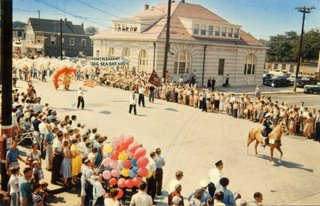 Today, I walk a short distance down the street to the Point Pleasant Beach Seafood Festival – the biggest civic event of the year in our little town. The two busiest streets in our downtown business district are closed off, and lined with various booths offering craft items and non-profit organization literature. There's an entertainment stage as well, but by far the biggest draw is the booths sponsored by local seafood restaurants – of which, as a beachfront resort community, we've got many.
Today, I walk a short distance down the street to the Point Pleasant Beach Seafood Festival – the biggest civic event of the year in our little town. The two busiest streets in our downtown business district are closed off, and lined with various booths offering craft items and non-profit organization literature. There's an entertainment stage as well, but by far the biggest draw is the booths sponsored by local seafood restaurants – of which, as a beachfront resort community, we've got many.The closed-off streets are packed with people: so many, it's hard to walk. In a typical year, something like 40,000 people attend the Seafood Festival. This year's not so typical, because the event was postponed one day, due to the threat of rain (only a threat, as it turned out; yesterday was gorgeous, and would have been a perfect Festival day). The event got bumped to today, a Sunday – which caused its own set of problems for us in the churches.
It didn't occur to anyone from the Chamber of Commerce or the Borough Council to tell us, in the churches, that the rain-date starting time had been changed. (In past rain-out years, the Festival's started at noon – which was tough, but not impossible, for the churches.) This year's 10:00 start time took us by surprise. Knowing that, after 9:00 a.m. or so, there would be no parking places to be had within many blocks of the church, we made the decision late on Friday to cancel our 11:00 Sunday service. The 9:00 service was sparsely attended - by people who either live close enough to walk, or who got here just ahead of the onslaught.
Today, I'm feeling pretty angry at our municipal leaders, for blatantly overlooking the churches in their planning. In my sermon, I preach about the declining influence of churches in American life. There's a whole movement today, known as the emergent church movement, that shrugs and says "you can't fight City Hall" on this one: that churches had better just get used to the fact that the old era of civic religion in America is ended, and that our culture is careening headlong into secularism. We Christians had better start seeing ourselves, the emergent-church gurus warn, in a new way – before it's too late. The twenty-first century American church is not so much a valued community institution, as a mission outpost.
In the old days of civic religion – back when the Seafood Festival was known as “Big Sea Day” – elected officials wouldn’t have dreamed of closing the streets in front of churches on a Sunday morning, without someone at least picking up the phone and telling the churches what they proposed to do. Now, they just do it – with no apology and no explanation.
 (Historical photo: "Big Sea Day," ancestor of the Seafood Festival)
(Historical photo: "Big Sea Day," ancestor of the Seafood Festival)Still, it's a beautiful day – so, after worship, I change into casual clothes and go walking into town. I rub elbows with a lot of people I know – which is no surprise, because we've lived here almost 16 years. Many of the people I encounter ask me how I'm feeling, or make some supportive comment like "You're looking good" (remembering, no doubt, the days when they saw the hairless me pushing a shopping cart through the supermarket, or dropping off a book at the library). With each new encounter, I repeat the news that I've just had a good 3-month checkup at the doctor's, and my scan results were good.
I realize there's a sort of time lag going on here. Close friends, family and church members have been able to observe my progress more closely. The medical news I'm sharing today feels like old news to me, but to the people I'm talking to, it's current.
I'm not complaining, of course. I'm glad they remembered to ask. A cancer diagnosis creates ripples throughout an entire community. The people who are further out from the point of impact are affected much later.

We're all connected, though. And that's a good thing.